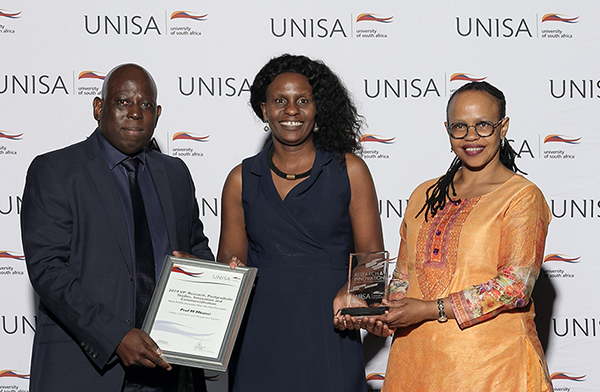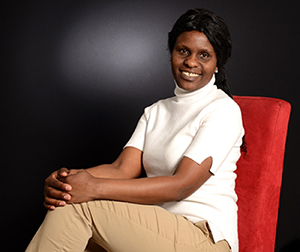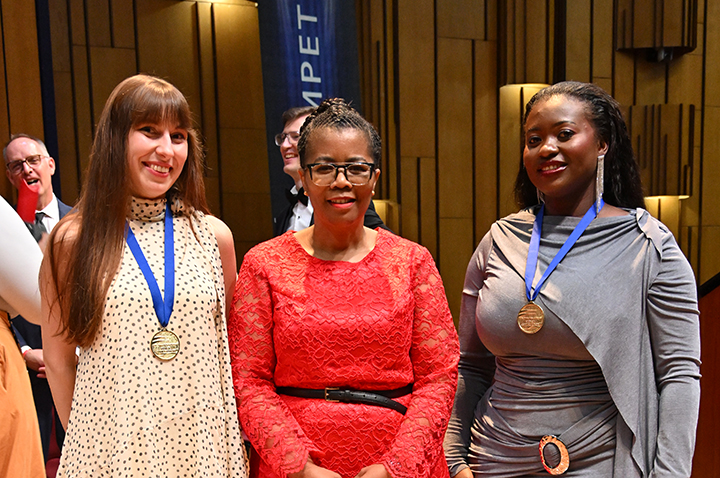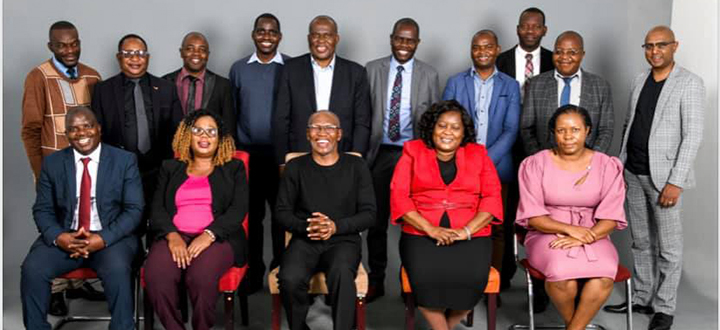
The largest provider of business education in Africa and one of the largest in the world
The e-groceries industry has been slow to take off in South Africa owing to the many roadblocks standing in its path, from high costs and erratic demand to the short shelf life of products, traffic jams and environmental impacts.

Ayanda Noma (Director: Innovation, Technology Transfer and Commercialsation) and Prof Thenjiwe Meyiwa (Vice-Principal: Research, Postgraduate Studies, Innovation and Commercialisation) congratulate Prof Marcia Mkansi (CEMS) (centre) on her membership of the 2019 Half Million Rand Club for the DST-NRF Conference Fund, as well as her 2019 Innovation awards for Most prolific innovator in 2019: Copyright Protected Innovation Category and the 2019 Vice-Principal: Research, Postgraduate Studies, Innovation and Commercialisation Most prolific innovator over the past five years (joint winner).
Prof Marcia Mkansi, one of Unisa’s two "most prolific" innovators of the past five years, is hard at work devising solutions to help clear some of those obstacles and enable online industries to start firing on all cylinders.
"Online retail in South Africa faces many supply and distribution challenges. For example, in the e-groceries industry, order volumes are low and distribution costs high, making it challenging to remain competitive. When perishable products such as fresh produce and chilled and frozen goods are ordered online, they have to be stored differently and moved according to stringent trading standards because quality is critical and they tend to have a short shelf life."
Mkansi, an associate professor in Operations Management at the College of Economic and Management Sciences (CEMS), says the situation is similar with healthcare products.
"Availability of medicines is a crucial element of universal health coverage as per Sustainable Development Goal 3, which aims at ensuring healthy lives and promoting wellbeing for all at all ages. However, achieving it presents a major challenge, especially in low-income countries, due to the multi-embedded supply chain challenge that creates a bullwhip effect. Moreover, the products are often fragile and require a lot of documentation, adding to the distribution costs and supply chain coordination challenges."

Prof Marcia Mkansi
It is not only the costs and complexities of online retail that concern Mkansi, however. Responsible management is important, too. In this era of climate change, the supply and distribution networks of online retailers should not worsen traffic congestion and push up carbon emissions.
"The basic problems in the current transport and logistics systems of many online retailers are characterised by multiple stops and slowdowns in traffic," she says. "This has a serious impact on fuel consumption and CO2 emissions per vehicle kilometre, and ultimately the cost of distribution."
Hence, Mkansi’s innovations aim to assist with supply and distribution issues while also being mindful of environmental considerations and congestion.
In the past five years, she has made no fewer than six disclosures, most for software-related innovations intended to improve supply and distribution networks, online and offline. Apart from software solutions for the e-groceries and e-healthcare industries, she is working on indigenous goods and a sustainability of non-renewable resource project, as well as a knowledge production project.
This prodigious output saw Mkansi being named joint winner of the Most Prolific Innovator over the Past Five Years Award at the 2020 Research & Innovation Awards - an honour she shares with Prof Lukas Snyman of the School of Engineering, also with six disclosures in five years.
Not content with that award, Mkansi also won two others at the R&I Awards event: Most Prolific Innovator for 2019: Copyright Protected Innovations Category, and a Half Million Rand Club Award for the DST-NRF Conference Fund in 2019.
Nor is this the first time Mkansi has won such accolades. In 2016, She was awarded a R2,6 million emerging researcher grant for her knowledge production project. "This grant made it possible for me to work from home from 2017 to 2019, which is why I was able to make so much progress with my innovations."
This progress is not limited to making disclosures. Commercialisation is very much on the horizon and some of her software has already attracted the attention of industry players.
"One of my innovations is being tested and a second one is at an advanced stage," Mkansi says, adding that she cannot disclose further details at this sensitive pre-commercialisation stage.
While working to turn her first six disclosures into sellable commercial opportunities, she continues to explore other possibilities for future innovation. Asked if it is unusual for an academic to be so involved in innovation, Mkansi says: "All of the innovations I am busy with are an extension of my research. Research and innovation are two sides of the same coin."
If, like Prof Marcia Mkansi, you have an innovation that you are currently working on, kindly contact the Directorate of Innovation, Technology Transfer and Commercialisation (DITTC) at innovation@unisa.ac.za for protection and commercialisation assistance.
* By Clairwyn van der Merwe, Contract writer, Directorate of Research Support
Publish date: 2020/04/19
 Unisa celebrates a project of hope, dignity and student success
Unisa celebrates a project of hope, dignity and student success
 Women vocalists take top honours at Unisa's globally renowned showcase
Women vocalists take top honours at Unisa's globally renowned showcase
 African wealth is dependent on investment in education and development
African wealth is dependent on investment in education and development
 Unisa celebrates matric result success at Correctional Services ceremony
Unisa celebrates matric result success at Correctional Services ceremony
 Unisa ICT Director recognised among acclaimed IT leaders
Unisa ICT Director recognised among acclaimed IT leaders